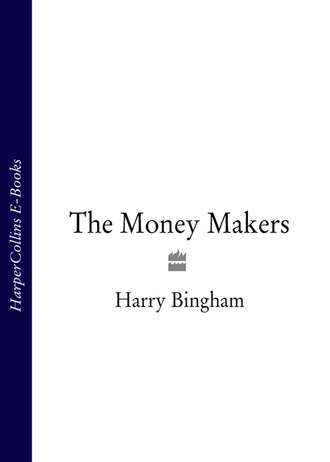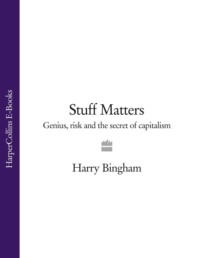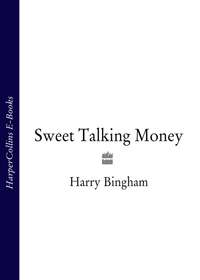
Полная версия
The Money Makers
Back at his desk, Matthew came in for a bit of stick.
‘Go to Paris for breakfast but don’t even bring me back a bloody croissant,’ complained Luigi. ‘It’s a good job I tell Big Mac to fire you yesterday.’
‘Oui, but it was an expensive breakfast,’ said Jean-François. ‘I don’t think the firm pays for taxi rides outside London, so I think you pay, no, Matthieu?’
‘I don’t know if I can afford to. Big Mac still hasn’t told me if I’ve got a job.’
Matthew glanced over towards McAllister’s office to see if this was a good time to interrupt. The door was closed, and the lights were off. Luigi followed Matthew’s glance.
‘Big Mac’s away on holiday, Matteo. He only came in this morning for an hour or so. He’ll be back a week on Monday.’
Matthew had been too tired to be nervous earlier, but now that changed. Matthew stared at the empty office. It would be ten days before he got a decision. Ten days, and meantime he didn’t know if he was still in the running for his million or if he’d fallen at the first hurdle. Anxiety took its first long feed from Matthew’s stomach lining. He turned away unhappily, aimlessly. As he did so, a bagel crust flew through the air and struck him on the neck. Luigi.
‘How much longer you keep us waiting for cappuccino?’
Autumn 1998
Autumn in England, and nothing to report. Leaves are just starting to give up their greens in favour of a sickly yellow, which will soon give way to a matt and uninteresting brown. After this brief show of what is politely known as colour, the leaves will fall to make a slimy brown carpet beneath the bare trees and boys will fight for the shiniest conkers. Meanwhile, after a sodden August bank holiday, the usual parade of crying children and stationary traffic, the skies have turned an iron grey.
Bid farewell to the sun. It is 1 September 1998, and there are 1046 days to go until Bernard Gradley’s deadline.
1
‘Good morning, sir.’
The red-coated doorman held the door open. Zack walked through with a shudder. In an age of automatic doors, revolving doors, doors you could just push through, Coburg’s had to employ some ancient flunkey in a red tail coat to do the job. That said it all. Coburg’s is one of Britain’s biggest merchant banks, but its glory days are long gone. The big American banks – Goldman Sachs, Merrill Lynch, Morgan Stanley, Madison, Weinstein Lukes – bestride the globe, while Coburg’s, a village beauty in a world of supermodels, clings to its past and tries not to look.
Zack knew this. He knew that Coburg’s wouldn’t make his fortune. But it was a doorway into international finance, the only industry in the world where millionaires aren’t rare, they’re commonplace. Even amidst Coburg’s dilapidated glories, Zack could smell the money and he loved it.
His boss was a posh nonentity called Fabian Slater, who collected him from reception and took him on a quick tour of the bank. Zack shook hands, exchanged greetings, and avoided saying anything he felt. Slater said, ‘In my opinion, the best way to get ahead is to lie low for a couple of years, soak up as much as you can.’ Zack smiled and said nothing. He had other ideas. He shook more hands, met more people in more departments: mergers and acquisitions, equity capital markets, debt capital markets, credit.
There wasn’t much to see. On a trading floor, you can smell the marketplace. On a busy day, when the markets are roaring, a well-run trading floor looks and sounds like barely organised mayhem. You can hear the flood of money pouring through the room. But that’s Matthew’s world, not Zack’s.
Zack belongs to the quieter world of corporate finance. To its unremarkable offices, the world’s biggest businesses come to sort out their financial needs. Some come to raise money, in the hundreds of millions, billions even. Some come to play safe, to protect against the risks that a difficult world is full of. Others come to play fast and loose, taking dangerous bets concealed from their shareholders by a paragraph of flim-flam in an annual report. Best of all, this is where companies come when they’re in the mood for attack. Scared of your competitor? Buy him. Noticed an outfit with faster growth? Grab it. Think you could run that guy’s business better than him? Buy him up, push him out, rip up his company and flog it.
Traders think testosterone is all about how loud you can shout, and how big are the risks you take with other people’s cash. Zack knew different. The quiet world of corporate finance, where bankers and company executives talk in whispers, has its own testosterone load. It doesn’t shout. It isn’t flashy. But it’s just as greedy, just as ruthless, just as hard.
‘Just one more person you ought to meet,’ drawled Slater. ‘Girl called Sarah Havercoombe. D’you know her by any chance? You must have overlapped at Oxford, I think.’
‘Sarah? Sarah Havercoombe? Yes. I know her.’
By God, he knew her. At Oxford, he and Sarah had had a stormy on-and-off relationship for three years. She was blisteringly well-connected and rich with it. Her father was a viscount with an ancestral seat in Devon. Unlike most aristocratic families, the Havercoombes had nurtured their wealth prudently and amassed it buccaneeringly. The family stake in a Hong Kong company, Hatherleigh Pacific, made them one of the two hundred or so wealthiest families in the country.
‘Sarah,’ called Slater, as he walked up to a young woman, faced away from them, mannishly dressed in a pink cotton shirt and a plain navy skirt, ‘I think you know our latest recruit. I’ll leave you together, shall I?’
Slater left them, while Sarah Havercoombe looked round and started in surprise. She hadn’t changed. Short brown hair, nearly blonde, worn with the inevitable hairband. Wide, strong face, clear-complexioned, but a bit too solid to count as beautiful. Minimal make-up, but plenty of confidence. Her widely spaced eyes lit up in surprise.
‘Sarah! Hi!’ said Zack, ‘I didn’t know you worked here.’
‘Well, I do.’
‘So I see. I’ve just joined. Less than an hour ago, actually.’
‘Welcome aboard, I suppose.’
Zack could feel the electricity already starting to rise behind this inane exchange, and wondered if she felt it too. Their relationship had been the most passionate either of them had ever known. It had been passionate in a sexual sense for sure. Scarcely a day had passed without their making love at least once and usually two or three times or more. But it had also been passionate in a worse sense. They had argued incessantly. They were strong-willed and had nothing in common. She loved balls, parties, horses, country houses. He loved philosophy, cynicism, and hating the things she liked. They had argued, stormed, and made love. Their friends had told them they didn’t belong together. Their heads had agreed but were powerless in the teeth of their bodies’ overwhelming mutual longing. Only when Sarah had finally left Oxford did distance allow the inevitable to happen.
‘What’s new?’ asked Zack.
‘I’m engaged,’ she said, ‘to a chap you might know. Robert Leighton.’
Sarah sounded like she expected Zack to know who she meant, but he didn’t. He raised his eyebrows.
‘He was at Eton while you were there, but I wouldn’t expect you to remember him … He’s nice and kind, he likes what I like, he loves me very much.’
Zack hadn’t meant anything by his question. He just asked it to say something and to defuse the electricity rising in the air. But her answer told him something. She felt the crackle of static too and she thrust her engagement at him as a defence.
‘That’s great news. I’m delighted. I hope everything works out really well for you both. I’m sure it will.’
‘Yes, I’m sure it will. And thanks.’ Their eyes met briefly then moved away. ‘Here, have you met the equity origination group yet?’
Zack walked off to shake more hands and grin at another set of people whose jobs he didn’t understand. Their voices were firm with each other now, just pleasant, nothing too familiar. But all along his right-hand side, where she walked beside him, he felt a prickle beneath his skin. Careful as he was to remind himself to keep guard, to step back, to break contact, two thoughts persisted.
First, he remembered just how good their sex had been. It had puzzled both of them that their sex could be quite so good when their relationship was such a disaster. It was almost as though their bodies understood something the rest of them had yet to grasp.
Second, it occurred to him for the first time that the future husband of Miss Sarah Havercoombe would step right into one of England’s richest families. For Miss Sarah Havercoombe, a million pounds would be small change indeed.
2
The sign must have been painted thirty years ago. ‘The Gissings Modern Furniture Company (Ltd)’, it boasted in giant pink lettering. ‘Our modern furniture means modern style but modest prices!’ The feeble pun was complemented by a picture of a secretary, complete with miniskirt and beehive hairdo, gesturing inanely at a suite of office furniture. No doubt it had looked cool in 1963, but in the late 1990s prices would have to be very modest indeed to tempt the average buyer.
George slowed his Lotus and turned in between the factory gates. Beyond the factory, there were a few fields of rough grazing, then open moor. It would be a bleak place to work in winter, comfortless in summer. A couple of men dawdling across the yard glanced at the newcomer, then stared. Not many Lotuses came to The Gissings Modern Furniture Company nowadays.
George turned the engine off and listened to its musical notes dying away. The yard which doubled as a car-park was covered with a mixture of rainwater, gravel, wood chippings, and machine oil. George poked his beautifully shod foot out of the car and stood up carefully, making sure his turn-ups weren’t dirtied by contact with the ground. He drew his Dior sunglasses from his jacket pocket, put them on and walked over to the door marked ‘Reception’.
A listless woman at the reception desk put down her copy of Puzzler magazine and stared at the apparition. George stared back. ‘Tom Gissing, please.’
The receptionist gestured towards a hideous suite of furniture in the corner of the small lobby. ‘Please sit down,’ she said. ‘I’ll let Mr Gissing know you’re here.’ George sat on one of the Gissings chairs in the corner, which wheezed and creaked as he lowered himself. Just for a moment, George wondered why he’d come.
In time, an elderly man limped over to George.
‘Mr Gradley? George Gradley?’ he said shaking George’s hand. ‘I knew your father, you know, back in the sixties when he was starting up. Tried to have him join our Chamber of Commerce and Rotary Club, but I fear he was a little fast for our ways. Still, he did well for himself and we’d have liked to have had him. You do look like him, you know. Everyone must tell you that. I’m very sorry, of course, to have learned of his, er, accident’ – the old man couldn’t bring himself to use the word death – ‘I always feel these things are terribly hard on the young. So much less experience of loss, you see. Nothing, really.’
As the old man rambled on, he led George to the proudly named executive office. A secretary, only about thirty but already ageless, watched them grimly.
‘D’you want tea?’ she asked.
‘Coffee, please,’ said George.
‘The machine’s knackered, so you’d best have tea,’ she said and left the room. She was short and squarely built, much as George himself was, and much as Bernard Gradley had been too. The ginger hair which crowned George’s head was there on hers too, worn in a bob. Her face was a bit wonky and her chin was too broad to be quite feminine. But George’s face was crooked too and his features were hardly delicate. To a stranger, the two of them would look like brother and sister. The old man took George to a table at one end of the room and twitched at some papers which lay there.
‘Mr Ballard from the bank told me you would be coming. It’s a relief to see you, not the receiver. I am afraid we had more or less resigned ourselves to that fate.’
‘Yeah, well, I haven’t made any decision yet.’
‘No, of course not. Well, you couldn’t. I mean, you’ll want to see the shop floor, and the cutting room, and the paint shop. And we have some wonderful designs on the drawing board right now. All we really need is a bit of a cash injection and I really believe we’d get ourselves going properly again. And our workers are excellent, you know. We’ve always kept the traditional craft methods here, and all our lads are properly trained. Lord, some of them must have forty years’ experience and I know there’s a round dozen of them who have been here longer than I have. Quality. That’s what we’ve never sacrificed. Our buyers don’t always recognise it these days. Don’t really care whether a joint is dovetailed or glued, you know. But if you do things the right way, it’ll tell in the end. Quality never goes out of fashion. That’s my motto. Well, my father’s actually. But he was right about that.’
A mug of tea slapped down in front of George.
‘Ye didn’t tell me how ye liked it, so I gave you two sugars.’
‘Thank you, Val,’ said the old man.
George didn’t like tea much, but the day before he’d enjoyed a rare day in London celebrating a friend’s new racehorse at the Café Royal in Regent Street. The meal had been served on the whitest china. The bergamot scent of Earl Grey tea had mingled with the smell of freshly baked cakes, warm napkins, women’s perfume, polished wood, and the promise of smoked salmon and brown bread. Kiki had been there, petite and elfin in a pale blue dress, gorgeous and inaccessible. She’d complained because ‘I had to fly to Paris two times for the dress fitting, then go back again because I swear there aren’t any nice shoes in London.’ As she complained, she’d twirled around angling for compliments which George and others had willingly supplied.
The smell of the tea steaming in front of him brought him back to reality. The tea was strong enough to poleaxe a navvy and the sugar had been added with a shovel. Jesus Christ. George was penniless. In a month or so’s time when his cash ran out, George wouldn’t even be able to afford a mug of tea like this one. And as for mingling with the likes of Kiki, the thought was absurd. The only way she knew how to have a cheap day out was to forget her purse, and that only meant somebody else picked up the bills. George shoved his mug away.
‘Let’s take a look around,’ he said.
The old man led him around the factory. A sawmill operated at one end of the complex. Logs came in, were sawn and treated, and lay stacked in neat rows. Right now it was clear that the sawmill was not exactly busy. The few men who were there made no pretence of working when they saw their boss. Instead they stared bluntly at George and George was not left in much doubt whether they approved of what they saw. The day was dull with rain on the moors, but George tucked his sunglasses more firmly on to his nose.
The factory floor was busier. Around half the men glanced up and continued to work, the rest gave George the same candid appraisal he had received in the sawmill. The verdict, he guessed rightly, was the same.
The old man hadn’t lied when he spoke of craft methods. The factory used machine tools, of course, but each piece of furniture was sawn and assembled by hand. Gissing showed George how they had been forced to compromise standards by the imperative of cutting costs. Dovetailed joints had given way to tongue-and-groove, tongue-and-groove to nails and glue. Old man Gissing seemed to want to lament each nail until George dragged him off. The tour finished with the paint shop, the warehouse, and a totally absurd factory shop, whose last customer had died in the shock of the Profumo scandal.
Back in the executive office, the old man pulled out the company’s accounts. It was a relief to see they had been run off using a computer, not a quill pen. George pored over the papers. Until a little over two months ago, he’d never looked at a balance sheet in his life and vaguely thought that double-entry book-keeping was something practised by the shadier sort of bookmaker. He’d had plenty to learn.
He looked at the annual accounts for every year since 1980. He looked at the monthly reports for each of the last thirty-six months. He had Tom Gissing explain to him in laborious detail the intricacies of the ‘LIFO’ inventory reporting system, the reducing balance method of depreciation, the acronyms used to identify the machine tools logged on the register of assets. He even drank two mugs of peaty tea.
After eight solid hours he understood the story. Back in the early eighties, recession had actually been kind to Gissings. Larger competitors had seen their export markets wither and hadn’t chopped their costs quickly enough. Gissings, without an export market to lose, had trimmed costs, redesigned its products, and made money. It had earned revenues of £1.9 million on costs of £1.7 million. Mr Gissing, as managing director, had elected to pay the shareholder, Mr Gissing, a handsome dividend of £50,000. But that was a long time ago.
The profit spurt of the early eighties dwindled away as other companies found their feet. For the last part of the decade, the company had bumped along at break-even, squeezing capital expenditure here, trimming marketing budgets there, forsaking product development in favour of cosmetic changes which came too little, too late.
The recession of the nineties had been cruel. In the last year before the economy tanked, old Tom Gissing had somehow persuaded his bank to approve a loan of £400,000. The idea was to provide the impetus for a major renewal. The production area was to be expanded and modernised, and new computer design systems would be introduced. Perhaps – just perhaps – if all had gone according to plan, The Gissings Modern Furniture Company would have found a new lease of life.
But recession came. Gissings’ markets trembled and collapsed. The money from the loan went to meet the company’s losses. Worse still, the prime contractor on the construction work went bust with the job half done and Gissings’ advance payments in his pocket. Redesign of the product range was halted. Costs were trimmed when they should have been slashed. The £400,000 loan ballooned into £550,000, with arrears of interest. Penalty interest was now being charged and the dangerous snowball gathered momentum at a compound rate.
Meanwhile, old man Gissing had lost his will to fight. He spent his time sorting through the company archives and threw his remaining energies into setting up a ‘museum’ to lure visitors to the factory shop.
The bank had been tolerant, but its patience was at an end. Three weeks ago the bank had called in its loan. Gissings had thirty days to find the cash. If it failed, the official receiver – a cross between a bailiff and an undertaker – would step in. He would auction the company for whatever he could get, and if he thought the company would fetch nothing, he’d close it down and sell the assets piece by piece. Either way, Tom Gissing wouldn’t end up with a brass farthing.
The thought terrified the old man. Losing the company to someone else would be hard, but watching the firm die would probably kill him. That was why he had called in the accountants. The accountants had come in, drawn up a report, and stuck an ad in the ‘Businesses for Sale’ page of the Financial Times. That was where George had found the name, and where he’d obtained the report which had encouraged him to make the visit. But whatever rosy words the accountants used, the company was in a desperate plight.
It was now eight days before the deadline and the evening was drawing on. George had read everything, examined everything. He had seen all he wanted and still had no idea whether this walking dead company could ever live again. On the other hand, there were some simple facts he hadn’t lost sight of. He had no money, so buying anything at all would be a triumph of sorts. Also, he had traipsed across Britain for two months in search of a company he could buy for next to nothing. So far he’d found nothing at all. The good companies were totally unaffordable. The bad ones much worse than hopeless. And Gissings, for all its faults, had one major advantage: it still sold one and a half million quids’ worth of furniture each year. That meant there was something to work with.
The old man came back into the room. In the deserted factory buildings only George, the old man and his secretary were left. In the course of the day Tom Gissing had floated away from reality altogether. At times he seemed to think he was selling his company for a small fortune. At other times he treated George like a business partner and spoke of how they would develop the business together. Sometimes it was as though George were a historian, there to record the proudest moments of the company’s glorious past. It was pathetic. George wanted out.
Gissing dumped another load of papers on to the table.
‘I expect you’ll be wanting to see these next. Some of our very earliest brochures. See this? The Thunderer! What a name for a desk, eh? Very daring at the time, I can tell you.’
George interrupted rudely.
‘I’ve come to buy your company.’
The old man sank into a chair.
‘Yes. Yes, of course. Quite right.’
‘Have you had any other offers?’
The old man shook his head. ‘No.’
‘It’s not worth much right now, is it? Not with half a million quid of debt. Not when you haven’t made a profit for six years.’
‘No, well, I suppose you’re right. Still you never know. Things look a bit rough, but we’ve never lost hope.’
‘Yeah, well, whatever,’ said George. ‘I want to make an offer for the lot. Factory, designs, inventory. The lot.’
The old man licked his lips, which had gone suddenly dry. ‘How much?’ he croaked, his voice barely audible.
The question threw George. He’d only just made up his mind to make an offer, and it hadn’t occurred to him to think of a price. He shoved his hands into his pockets for inspiration.
‘I’ll give you a pound,’ he said, tossing a coin on to the table. It spun for a moment then fell over. ‘If you give me the company, I can recapitalise it and make it live. If you don’t, the company and all your hard work will die. The bank will kill it. You know it will.’
George hadn’t intended to be cruel, but he was feeling awkward, and awkwardness made him tactless. He wondered whether he should say something, an apology maybe or something to try and buck the old man up, but he was held fast in the room’s gathering silence. For an infinite moment, the old man stared down at the golden disc. His rheumy blue eyes filled suddenly with tears. His lips opened and closed without sound. Finally his hand, shaking violently, closed over the glittering coin.
‘Good luck,’ he said. ‘Take care of things. You will take care, won’t you?’ The old man began to shuffle from the room. The pound coin was clenched so tightly in his hand that George feared he would cut himself. Then at the door he turned and added, ‘Oh – the name. It’s yours to do as you please with now – but I’ve always liked the name. Gissings Furniture. It’s got a ring to it. Anyway, best of luck.’
His footsteps moved hesitantly away down the dark corridor which then fell silent.
The old man’s secretary had watched the whole scene. Her eyes blazed with contempt.
‘Delighted to have you on board, sir,’ she spat.
She held George’s eyes a moment, then she too turned and walked away, her face angry and complex, her deep eyes invisible. Minutes passed, and George was left, the only person in the whole factory.







